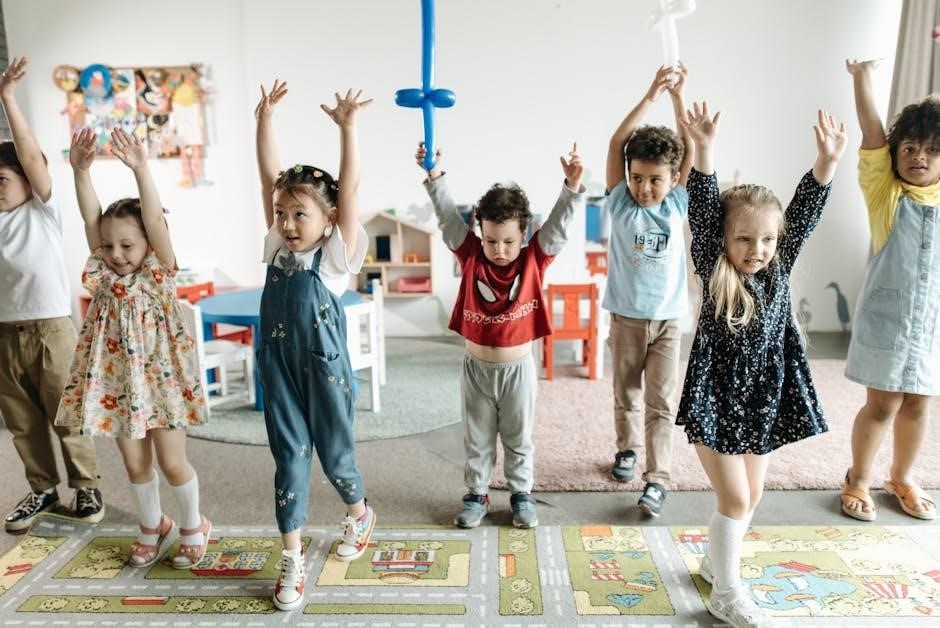Importance of Social Emotional Learning (SEL)
Social Emotional Learning (SEL) fosters essential life skills, enhancing self-awareness, emotional management, and relationship-building. Printable worksheets offer structured activities, making SEL accessible and engaging for students of all ages.
1.1 Benefits of SEL for Students
Social Emotional Learning (SEL) empowers students to understand and manage their emotions, leading to improved decision-making and healthier relationships. Printable worksheets provide structured exercises that enhance self-awareness, helping students recognize their feelings and develop empathy. These activities promote problem-solving skills and foster a sense of responsibility. SEL also encourages academic success by teaching students to stay focused and motivated. By practicing conflict resolution and collaboration, students build stronger social bonds and learn to navigate challenges effectively. Printable SEL resources, such as emotion check-ins and empathy-building exercises, offer engaging ways to develop these critical life skills, preparing students for personal and professional success.
1.2 Role of Worksheets in SEL Development
Printable worksheets play a vital role in fostering Social Emotional Learning (SEL) by offering structured, engaging activities that guide students in developing essential skills. These resources provide clear exercises for recognizing emotions, practicing empathy, and improving self-regulation. Worksheets such as emotion check-ins and empathy-building activities help students explore their feelings and understand others’ perspectives. They also serve as practical tools for teaching conflict resolution and decision-making. By incorporating these worksheets into daily or weekly routines, educators can create a supportive environment for SEL growth. Their versatility makes them suitable for various age groups, ensuring that students can develop these critical skills at their own pace. Printable SEL worksheets are invaluable for making learning interactive and accessible, fostering personal and social development effectively.

Key Components of SEL
Social Emotional Learning (SEL) focuses on five core components: self-awareness, self-management, social awareness, relationship skills, and responsible decision-making. These elements work together to foster emotional intelligence and well-being.
2.1 Self-Awareness

Self-awareness is the foundation of Social Emotional Learning (SEL), enabling individuals to recognize their emotions, strengths, and weaknesses. Printable worksheets, such as emotion check-ins and self-reflection activities, provide structured tools for students to explore their feelings and thoughts. These resources help students identify patterns in their emotions and understand how their actions impact others. By fostering self-awareness, students gain the ability to take ownership of their learning and personal growth. Worksheets often include exercises like journaling, mood charts, and goal-setting templates, which encourage introspection and self-expression. This component of SEL equips students with the skills to manage their emotions effectively and develop a positive self-image.
2.2 Self-Management
Self-management is a critical component of Social Emotional Learning (SEL), empowering individuals to regulate their emotions, behaviors, and thoughts. Printable worksheets provide practical tools for students to practice self-control and develop healthy habits. Activities such as mood journals, goal-setting templates, and impulse-control exercises help students manage stress and make intentional decisions. These resources guide students in identifying triggers, developing coping strategies, and maintaining focus. By enhancing self-management skills, students improve their ability to navigate challenges, prioritize tasks, and achieve personal and academic goals. Worksheets also encourage reflection, helping students recognize progress and build resilience. Effective self-management fosters a positive mindset, enabling students to thrive in both school and life.
2.3 Social Awareness
Social awareness is the ability to understand and respond to the needs of others, fostering empathy and positive relationships. Printable worksheets designed for Social Emotional Learning (SEL) offer engaging activities that help students develop this skill. These resources include exercises like perspective-taking scenarios, empathy-building prompts, and group collaboration tasks. Worksheets often feature role-playing activities, where students practice responding to different social situations. Additionally, they may include reflection exercises that encourage students to consider how their actions impact others. By using these tools, students gain a deeper understanding of diverse perspectives and social norms. This enhances their ability to navigate complex social environments, resolve conflicts, and build meaningful connections. Cultivating social awareness through structured activities prepares students to contribute positively to their communities and interact thoughtfully with others. These skills are essential for fostering inclusive and supportive social dynamics.
2.4 Relationship Skills
Relationship skills are vital for building and maintaining healthy connections with others. Printable SEL worksheets offer activities that help students develop communication, cooperation, and conflict-resolution abilities. These resources often include role-playing exercises, group projects, and reflection prompts. For example, worksheets might guide students in practicing active listening or expressing emotions effectively. Some activities focus on resolving peer conflicts through dialogue and compromise. Others encourage teamwork and mutual respect. By engaging with these exercises, students learn to navigate social dynamics and foster positive interactions. Strengthening relationship skills through structured activities helps students build lasting friendships, collaborate effectively, and resolve disagreements constructively. These skills are foundational for creating supportive and inclusive environments, both in and out of the classroom. Effective relationship skills empower students to contribute positively to their communities and thrive in diverse social settings.
2.5 Responsible Decision-Making
Responsible decision-making is a cornerstone of SEL, enabling students to make thoughtful choices that consider consequences and ethical implications. Printable worksheets provide structured exercises to guide students in evaluating situations, weighing options, and reflecting on outcomes. Activities often include scenario-based dilemmas, where students practice resolving conflicts or addressing challenges in a responsible manner. Worksheets may also incorporate goal-setting templates, helping students plan and prioritize effectively. Additionally, reflection prompts encourage students to consider how their decisions impact themselves and others. These resources help students develop critical thinking and problem-solving skills, fostering a sense of accountability and ethical awareness. By engaging with these exercises, students learn to navigate complex situations confidently and make choices that align with their values and responsibilities.

Printable Worksheets for SEL
Printable SEL worksheets offer structured activities to enhance emotional intelligence and social skills. They provide engaging exercises for self-awareness, empathy, and decision-making, suitable for various age groups and learning needs.
3.1 Emotions Check-Ins
Emotions check-ins are a vital tool for fostering self-awareness and emotional regulation. Printable worksheets designed for daily feelings check-ins help students identify and express their emotions effectively. These activities encourage reflection, allowing students to process their feelings and develop emotional intelligence. By incorporating these exercises into daily routines, educators can create a supportive environment where students feel comfortable discussing their emotions. Emotions check-ins also promote empathy and understanding among peers, fostering a positive classroom culture. With engaging and age-appropriate designs, these worksheets make emotional learning accessible and enjoyable for all students, regardless of their developmental stage. Regular practice strengthens students’ ability to recognize and manage their emotions, laying a strong foundation for social-emotional growth and overall well-being.
3.2 Empathy-Building Activities
Empathy-building activities are essential for helping students understand and share the feelings of others. Printable worksheets designed for this purpose often include exercises like perspective-taking, role-playing, and scenarios that encourage kindness. These tools help students develop compassion by engaging them in activities that simulate real-life situations. For instance, worksheets with “warm words” or “kindness chains” teach students the impact of their actions on others. Such activities not only enhance interpersonal skills but also create a supportive classroom environment. By practicing empathy through structured exercises, students learn to appreciate diverse perspectives and build stronger, more meaningful relationships. These worksheets are particularly effective when integrated into daily or weekly routines, making empathy a habitual part of students’ social-emotional development. Regular engagement with these activities fosters a culture of understanding and respect.

3.3 Conflict Resolution Exercises
Conflict resolution exercises are vital for teaching students how to manage disagreements constructively. Printable worksheets designed for this purpose often include role-playing scenarios, problem-solving prompts, and reflective questions. These activities help students identify the root causes of conflicts and practice effective communication strategies. For example, worksheets may guide students through step-by-step processes like active listening, expressing emotions calmly, and proposing solutions. Some exercises also incorporate collaboration, encouraging students to work together to resolve hypothetical or real-life disputes. By engaging in these structured activities, students develop essential skills like negotiation, compromise, and empathy. These exercises not only reduce misunderstandings but also foster a more harmonious and respectful classroom environment. Regular practice with conflict resolution worksheets equips students with the tools to handle challenges confidently and peacefully, both in school and beyond. Such skills are foundational for lifelong positive relationships and social success.

Free Resources for SEL Worksheets
Free resources for SEL worksheets include websites offering printable PDFs, such as self-esteem and empathy-building activities. These tools support educators in fostering emotional growth across grade levels effectively.
4.1 Websites Offering Free Printables
Several websites provide free printable SEL worksheets, offering a variety of activities tailored to different age groups and learning objectives. Popular platforms include educational resource sites that specialize in social-emotional development, offering downloadable PDFs for emotions check-ins, empathy-building exercises, and conflict resolution strategies. These websites often cater to both elementary and high school students, ensuring accessibility for diverse educational needs. Many resources are designed to be engaging and interactive, incorporating creative elements like inspiring quotes, imagery, and hands-on activities to foster emotional growth. Additionally, some sites offer comprehensive bundles that include workbooks and lesson plans, making it easier for educators and parents to implement SEL effectively. These free printables serve as valuable tools for promoting self-awareness, relationship skills, and responsible decision-making in a structured and fun manner.
4.2 Activities for High School Students
High school students benefit from tailored SEL activities that address their unique developmental stage. Printable worksheets often include exercises focused on self-reflection, empathy, and decision-making. Activities such as quote analysis, where students interpret inspiring quotes, help foster deeper thinking and emotional connection. Empathy-building exercises, like perspective-taking scenarios, encourage understanding of others’ feelings and experiences. Conflict resolution worksheets guide students in navigating real-life situations, promoting healthy communication and problem-solving. Many resources incorporate creative elements, such as imagery and thought-provoking questions, to engage teens effectively. These activities not only enhance emotional intelligence but also prepare students for independent life by strengthening relationship skills and self-awareness. Free printable resources make it easier for educators to integrate these exercises into daily or weekly lesson plans, ensuring consistent SEL growth for high schoolers.

How to Use SEL Worksheets Effectively
Integrate SEL worksheets into daily routines, encouraging reflection and discussion. Use them as tools for goal-setting and habit-building, ensuring consistent practice of positive behaviors and emotional growth.
5.1 Tips for Educators
Educators can maximize the impact of SEL worksheets by incorporating them into daily routines and lesson plans. Start with short, engaging activities to ensure student participation and interest. Encourage open discussions to help students connect their emotions and experiences. Provide clear instructions and examples to guide them through the exercises. Use these worksheets as a tool for goal-setting and self-reflection, allowing students to track their progress over time. Additionally, adapt activities to suit different learning styles and age groups, ensuring inclusivity and effectiveness. By consistently implementing these strategies, educators can foster a supportive environment that promotes social-emotional growth and well-being.
5.2 Engaging Students in SEL Activities
Engaging students in SEL activities requires creativity and consistency. Begin with interactive exercises like emotions check-ins or empathy-building tasks to capture their interest. Use relatable scenarios or inspiring quotes to spark meaningful discussions. Encourage students to express their feelings through reflective journaling or group sharing. Incorporate hands-on activities, such as role-playing or conflict resolution exercises, to help them practice social skills. Ensure activities are age-appropriate and aligned with their developmental needs; Provide positive reinforcement and constructive feedback to build confidence. By fostering a safe and supportive environment, educators can help students embrace SEL as a valuable tool for personal growth and relationships.
